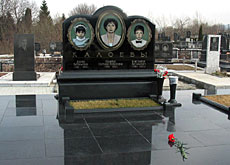
Group seeks to strengthen Swiss-Russian ties

As Swiss Foreign Minister Micheline Calmy-Rey visits Moscow, swissinfo reports on efforts at home to improve relations between Switzerland and Russia.
Bilateral ties suffered a setback in 2002, when 69 Russians died on board a plane that collided with another jet while in Swiss-controlled airspace.
Russia later blamed the Swiss authorities for dragging their feet during negotiations over compensation for families of the victims.
Calmy-Rey’s two-day visit comes six months after Swiss President Joseph Deiss sent a formal apology to his Russian counterpart, Vladimir Putin, in which he recognised the need to rebuild relations.
“The accident has placed a strain on relations between Switzerland and the Russian Federation. The Swiss government hopes that the numerous and long-standing connections between both states can [now] be strengthened again,” said Deiss.
The Switzerland-Russia Cooperation Council, which was established earlier this year with the support of parliamentarians from the four main Swiss political parties, aims to “bridge the divide” between the two countries.
Cool relations
Beatrice Lombard, the council’s general-secretary, told swissinfo that the 2002 plane crash over Überlingen in southern Germany – blamed in part on the delayed reaction of a Swiss air traffic controller – had cooled relations between Bern and Moscow.
“Switzerland still has a bit of a problem in Russia because of Überlingen. Many Russians were disappointed with the way Switzerland handled this and felt that the communication [in the months afterwards] was not as it should have been,” she said.
“That said, I think it’s fair to say that on a political level this matter has now been cleared up.”
According to Lombard, the challenge for anyone seeking to breathe new life into Swiss relations with Russia is to find a way of overcoming the “image problem”.
“In Switzerland, Russia still has a very bad image. People continue to think of the country in terms of the Iron Curtain, mafia and rampant corruption.”
Karl Eckstein, a Swiss academic based in Moscow and a founding member of the Switzerland-Russia Cooperation Council, blames the media for its coverage of events in Russia.
“You have the impression when you read the Swiss papers that all there is in Russia is corruption, theft, murder and terrorism. Of course, all this exists, but the media doesn’t really give an accurate impression of what the country is really like,” he said.
Eckstein added that the council intended to “correct” this perception by pushing for improved relations in the fields of politics, the economy, science and culture.
Tourism and business
One of the council’s main tasks over the next few months will be to lobby for the easing of visa restrictions for Russian and Swiss citizens who apply for travel and work permits.
“[Getting a visa] is terribly bureaucratic, so this is a dossier we really want to push. This presents us with something of a challenge, because in Switzerland if you want to change visa conditions, each canton has a say in the matter,” said Lombard.
Lombard added that the easing of visa restrictions would also encourage more Swiss tourists to visit Russia and give them the opportunity to reassess their preconceptions about the country.
“We need to bring both countries a bit closer… if you look at tourism, who do you know in Switzerland who has been to Russia? Very few people even think about going there.”
Council members intend to work in conjunction with Switzerland Tourism as well as tour operators to increase the flow of visitors between the two countries.
The council, which has the support of members of Switzerland’s business community, also hopes to contribute to the strengthening of economic ties by launching a series of training and exchange programmes.
One scheme currently under discussion would see Russian bankers come to Switzerland to gain first-hand experience of the Swiss banking system.
“This is not about telling them ‘look at how we can do things better’, but about improving cooperation and mutual understanding,” said Lombard.
swissinfo, Ramsey Zarifeh
Switzerland and Russia:
Population: 7.4 million (CH); 144 million (Russia)
GDP (2003): $318 billion (SFr430 billion) (CH); $434 billion (Russia)
Major Swiss exports to Russia: watches, pharmaceuticals, chemical products
Major Swiss imports from Russia: metals and machinery

In compliance with the JTI standards
More: SWI swissinfo.ch certified by the Journalism Trust Initiative





























You can find an overview of ongoing debates with our journalists here . Please join us!
If you want to start a conversation about a topic raised in this article or want to report factual errors, email us at english@swissinfo.ch.